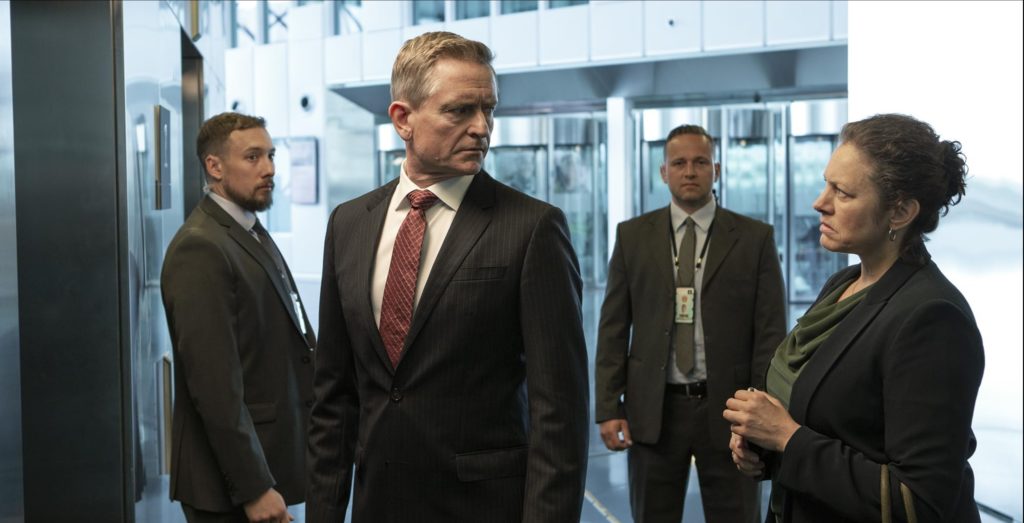“Occupied” was a gripping Norwegian TV series about the rise of a Green prime minister who decides to shut off Norway’s oil and gas production for the sake of the environment. Faced with the loss of Norwegian fuel, the European Union invites Russia to take over Norway’s off-shore oil platforms to keep the pipelines flowing south.
The fox having been invited into the hen house, Norway slowly becomes occupied by Russia as its apparatchiks establish their authority. The show explores the moral and political compromises that follow, asking who is a patriot and who is a collaborator?
As I listen to folks on both sides of the political divide in our own country, I am increasingly concerned that in our reactions, Americans of all stripes feel as if they are in an occupied land. For the red, the occupation is manifested in the universities and late-night television shows, the entertainment industry and the news media, the immigrants and guest workers.
For the blue, the occupation includes masked ICE agents, a Justice Department going after ideological enemies, and a government that seems increasingly beholden not to the Constitution but to a person, willing to use its might to impose its will on those citizens it deems “not on board.”
Pouring gasoline on all of this is social media, with algorithms intentionally designed to fuel rage and to reinforce our own biases.
This sense of occupation has been heightened by the growing political rhetoric of war and resistance. The language heightens the sense that one is a stranger in one’s own land. The use of military troops in relatively peaceful cities also heightens this tension, as does the idea of masked men seizing people off the street.
At the same time, viewed with another lens, the nightly network news and the increasingly scathing late-night comic commentaries suggest a hostile media landscape that allows for no dissenting views.
This division carries over to the courts, where there seems a growing chasm with every decision being judged as “red” or “blue,” less a matter of interpreting the law and more as a reflection of ideological prejudices.
A new Times/Siena survey confirms the sense of a majority of voters that the country is too politically divided to solve its problems (64%), versus the minority who feel it still can (33%).
This sense that we are broken and unfixable is predictable, for both sides feel they are not heard or understood, or that they are excluded. The other side becomes the hostile occupier — of the culture, of the political system, of the economy.
This occupation mentality comes out in our pronouns. Politicians are dividing our world into “us” and “them.” “We” signifies the half of the country that agrees with us. In an occupied land, those with us are patriots. Those against us are collaborators, even traitors. It is also evidenced by our silence. Americans increasingly feel that they can’t express their true feelings, afraid that they will be shunned by colleagues or worse. Not toeing someone’s party line is seen as dangerous.
What has already started is a ratcheting up of violent rhetoric. How one resists an occupation varies, but too often violent resistance attracts more attention than nonviolent. And the people most likely to act — young men with weapons and a sense of hopelessness — are the prey of this rhetoric. The killings of Charlie Kirk or the Minnesota Democratic state representative Melissa Hortman and her husband are only the most recent examples, and each side uses the deaths to create a sense of oppression and menace.
With both sides living in a country they believe is under “foreign occupation,” we are a parched land at risk of bursting into flame.
Perhaps the churches can play the role of fire warden.
In an Oct. 2 address, Pope Leo XIV had a suggestion. Overcoming the widespread sense that no one can make a difference “requires patience, a willingness to listen, the ability to identify with the pain of others and the recognition that we have the same dreams and the same hopes,” the pope said.
Recognizing our own contribution to the divisions in this country is a requisite first step. When we see those with whom we disagree as implacable foes, we make any sort of mutual understanding nearly impossible.
But where churches can play an indispensable role is in helping to break down the estrangement in their own communities. As the pope advises, this can only come with patience, a willingness to listen, an ability to identify with the pains and fears of others.
Such reconciliation may happen last in the halls of government. In our parish halls and churches, however, and with the guidance of organizations like Braver Angels, known for its red/blue workshops, perhaps the solution to our profound distrust of one another can begin from the bottom up.

